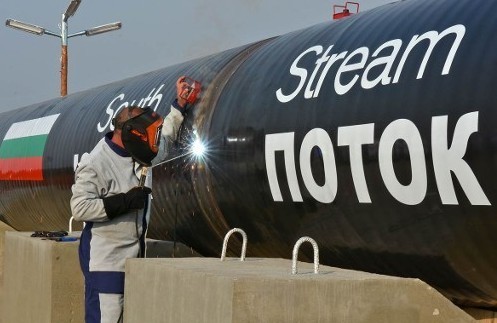BULGARIA-VICTIM OF SOUTH STREAM DISPUTE
Washington which is one of the main players in the gas crisis is doing its best to worsen the good relations between the EU and Russia in the energy field. The new authorities in Kyiv are used as a weapon. Moreover, with the first technical failure of the Ukrainian gas pipe, this time things look far more unstable with regard to the timely and the long-term gas supplies to Europe. By the way, a leader of the Ukrainian radical nationalistic Right Sector was threatening back in March to blow up the gas pipeline that was crossing Ukrainian territory and deprive Russia from the opportunity to sell gas and petrol to Europe. Russia, however, has successfully found new markets for its fuels. Is Europe, however, going to find new and reliable suppliers?
The attitude of the European Commission towards the strategic South Stream project also contradicts to the will of the European citizens to receive the cheapest gas possible from a reliable source.
The USA authorities are currently working on the adoption of a new legislation which is to simplify the export procedure of liquefied natural gas. This fuel is far more expensive that the Russian one and the continuation of the Ukrainian crisis and the worsening relations between Brussels and Moscow will force Europe to buy the American fuel.
The European Union raised the question about the legitimacy of the contracts regarding the construction of the Bulgarian segment of South Stream pipeline. The USA started to pressurize Bulgaria for its relations with Russian Stroytransgas Company which fell under its sanctions. The US Ambassador to Bulgaria Marcie Ries advised the Bulgarian business to avoid any collaboration with companies which suffered sanctions from the USA.
As a result, Bulgaria’s Premier Plamen Oresharski ordered the suspension of the construction works, in order to hold consultations with the European Commission on the matter. The opposition and some ministers declared in public that Oresharski did not have the right to initiate unilateral suspension of the project. Later Premier Oresharski was forced to confirm his orders in public.
The differences on South Stream project worsened in the most inappropriate time for Bulgaria’s government-the country suffered huge floods and two Bulgarian banks became victims of instigation aimed at making the citizens close their bank deposits.
As a result, Bulgaria’s President Rossen Plevneliev declared his intentions to dissolve the current National Assembly and appoint an interim cabinet which has to prepare new early Parliamentary elections.
On Monday, on the first day of the visit of Russia’s Foreign Minister Sergey Lavrov to Bulgaria, the main accent in his talks with the Bulgarian authorities fell on the South Stream gas pipeline project. Russia proposed that the work of the working group between the EC and Russia had to continue. Both Moscow and Sofia are positive that the EU can make another exception, even if the matter is tackled within the frameworks of the Third Energy Package.
Bulgaria and Russia have century-old cultural and spiritual links and must build their partnership in mutual interest, said on July 7 President Plevneliev upon meeting with Sergey Lavrov in Sofia.
Bulgaria expects the construction of the South Stream gas pipeline to continue through its territory several weeks after it receives specifications from the European Commission.









